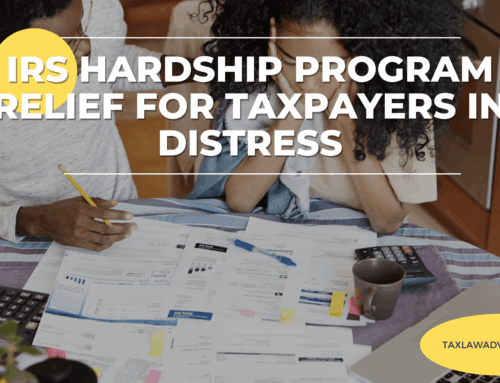Running a small business involves a multitude of responsibilities, from managing daily operations to ensuring products or services meet customers’ expectations. Amid these demands, one often-overlooked yet critical responsibility is meeting payroll tax obligations. Payroll taxes—federal and state income tax withholding, Social Security, Medicare, and unemployment taxes—are the financial backbone of employee-related compliance. When these taxes aren’t handled correctly, business owners risk facing severe penalties, personal liability, and even the threat of business closure.
Understanding what payroll tax issues are, why they occur, and the serious consequences of falling behind is essential for small business owners. Just as important is knowing how to resolve problems efficiently and effectively. Whether the issue stems from a simple oversight or a more complex financial challenge, taking prompt action and seeking professional guidance can make all the difference.
What Are Payroll Tax Issues and Why Do They Occur?
Payroll tax problems can arise from various sources, but they generally boil down to not depositing withheld taxes on time or not filing the required returns. As a small business owner, you serve as a kind of “trustee” for your employees’ tax withholdings—these funds are not yours to spend. They must be forwarded to the appropriate government agencies according to strict deadlines.
Common reasons for payroll tax issues include:
- Cash Flow Constraints: Seasonal slowdowns, unexpected expenses, or other financial crunches may tempt an owner to “borrow” from payroll withholdings. It might feel like a temporary fix to a short-term problem, but failing to remit withheld taxes on time quickly leads to trouble.
- Mismanagement or Lack of Expertise: Without a dedicated payroll specialist, it’s easy to make bookkeeping mistakes. Missing deadlines, mixing funds, or applying incorrect tax rates can all trigger non-compliance.
- Poor Record-Keeping: Inadequate tracking of hours, wages, and withholding amounts increases the risk of filing incorrect returns. If an audit occurs, you may find it challenging to prove compliance when documentation is scattered or incomplete.
The Consequences of Non-Compliance
Ignoring payroll tax obligations is not a risk-free choice. The IRS and state tax agencies take unpaid trust fund taxes very seriously. Consequences can escalate quickly:
- Trust Fund Recovery Penalty (TFRP): Perhaps the most severe penalty associated with unpaid payroll taxes is the TFRP. The IRS can hold owners, officers, and even certain employees personally responsible for unpaid payroll taxes. This is not limited to the corporate entity—personal assets can be at risk.
- Accrued Interest and Penalties: Delayed payments lead to mounting interest charges, late fees, and penalty assessments. A minor shortfall can balloon into a significant financial burden over time.
- Liens and Levies: If you continue to ignore the problem, the IRS can file a federal tax lien against your business property, damaging your creditworthiness and your ability to secure financing. Further down the line, the agency might enforce levies, seizing bank accounts, real estate, or equipment to settle the debt.
- Criminal Charges (in Extreme Cases): While rare, willful evasion of employment taxes can lead to criminal investigations and prosecutions. The penalties can include hefty fines and prison time.
Steps to Resolve Payroll Tax Issues
If you find yourself behind on payroll taxes, acting quickly is non-negotiable. Here are some steps to consider:
- Acknowledge the Problem: The worst thing you can do is bury your head in the sand. Open any notices you’ve received from the IRS. Determine how much you owe, including principal tax, interest, and penalties.
- Organize Your Records: Gather all your payroll documents, bank statements, accounting reports, and correspondence from the IRS. Having complete and accurate information at your fingertips will streamline any subsequent negotiations.
- Assess Cash Flow and Budget: Evaluate your current financial situation. Understanding your realistic ability to repay the outstanding taxes will help you choose the right resolution path. Consider what changes you can make—cutting expenses, improving collections from customers, or seeking a business loan—to free up funds.
- Contact the IRS or State Authorities: It’s often better to approach the IRS before they escalate actions. The agency offers multiple arrangements, including short-term payment plans and installment agreements, for qualifying businesses. You may also explore the possibility of an Offer in Compromise if your financial situation is dire. The key is to engage in good faith and demonstrate your willingness to comply moving forward.
- Seek Professional Help: Payroll tax laws are complex, and negotiations with the IRS can be daunting. This is where professional assistance becomes invaluable. Tax Law Advocates, staffed with federally-licensed enrolled agents, tax attorneys, and accountants who deal with both IRS and state authorities, can guide you through the process. They can help you determine the most suitable resolution strategy, handle negotiations, and ensure that your documentation and applications meet the IRS’s strict requirements.
- Set Up a Compliance System for the Future: Once you’ve addressed the immediate issue, take steps to prevent recurrence. Invest in reliable payroll software, consider hiring a payroll service provider, or schedule regular consultations with a tax professional. Being proactive ensures future peace of mind.
How the IRS Fresh Start Initiative Can Help
If you’re concerned about how to manage what seems like an insurmountable tax debt, the IRS’s Fresh Start initiative might offer relief. Designed to ease the burden on struggling taxpayers, Fresh Start programs can:
- Raise the threshold for filing a federal tax lien, giving you more time to pay before severe collection actions start.
- Expand access to streamlined installment agreements, making it easier for businesses with lower balances to set up an affordable payment plan.
- Offer additional options for penalty abatement and possibly help you pay less than you owe if you meet specific criteria.
Why Seek Professional Help from Tax Law Advocates?
The stakes are high when dealing with payroll tax issues. Beyond the immediate cost of penalties and interest, you risk personal liability and damage to your business’s reputation and financial stability. Tax Law Advocates can step in at any stage of the process to help you make sense of your obligations, negotiate effectively with the IRS, and put in place a long-term solution.
With their expertise, you can:
- Receive a thorough assessment of your financial and tax situation.
- Understand all available options for settling your debt.
- Ensure that every interaction with the IRS is professional, accurate, and strategically planned.
- Reduce the stress and uncertainty that often accompanies an IRS dispute.
A Timely Call to Action
Time is your enemy when it comes to payroll tax problems. Penalties grow, and enforcement actions loom if you remain passive. Don’t wait until the problem is too big to handle—reach out for professional assistance as soon as possible.
If you’re concerned about payroll tax issues, trust the team at Tax Law Advocates to provide sound guidance and robust representation. Call 855-612-7777 or visit taxlawadvocates.com today. Let them help you navigate the complexities of payroll tax obligations so you can protect your livelihood and focus on what matters most: growing your business. By acting promptly and seeking the right help, you can turn a stressful situation into a manageable one—and steer your small business confidently into the future.






